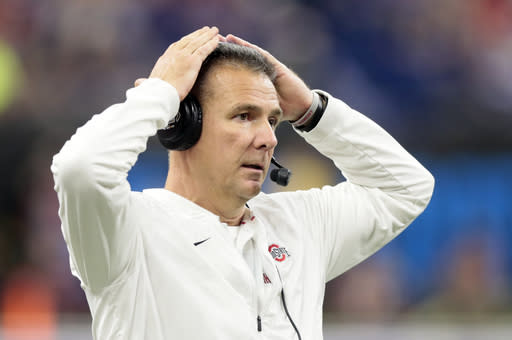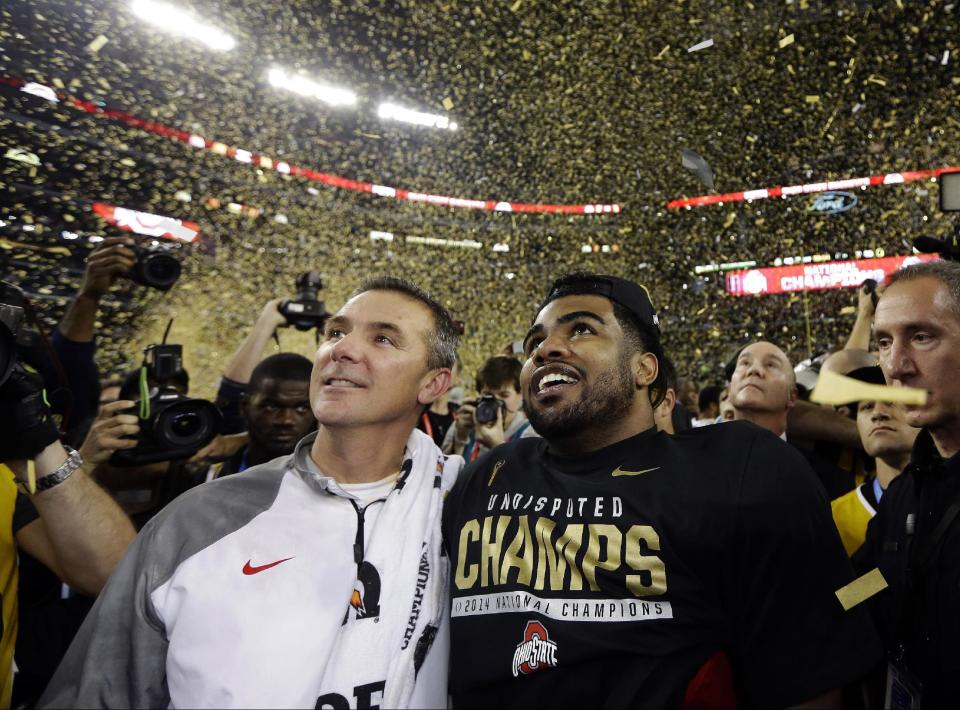Urban Meyer's legacy: Success, failure and a whole lot of drama
If only the moment could have been frozen.
On a clear, chilly Nov. 6 night in Salt Lake City in 2004, Utah smashed Colorado State. The Utes were undefeated, on their way to a 12-0 record and a national top-five ranking — a dream season at a school of modest football heritage. After the game, the 40-year-old coach wrapped his right arm around his wife, pumped his left fist in the air and led the team in the tradition he started — they all sang the fight song with the band and student section.
Stop the march of time, bottle it, put it on a shelf.
If the Urban Meyer story ended right there, with that moment I watched in Rice-Eccles Stadium that night, it would be sweetly uncomplicated. It would be less glorious, for sure, but also less troubling and controversial.
The Meyer story wasn’t ending. It was just getting started, with all its attendant melodrama. More than a decade of incredible winning and ugly headlines and strange health crises have now reached a new plot twist — Urban Meyer stepping down at Ohio State at age 54.
Next act, unknown.
If this were Nick Saban retiring in his late 60s, the accolades would flow in from every corner of the sport. Saban is the only coach of the 21st century to have accomplished more than Meyer. His three national titles at two different schools have earned legendary status — but it all comes with so much baggage and uncertainty attached.

How much antisocial behavior by players and staff was tolerated in the pursuit of victory? How fragile has his state of mind been all this time? And does anyone really believe this is the end?
This isn’t a clean break. Not a simple ride off into the sunset.
Trying to sum up the man’s career took me back to that night at Utah. It was a beautiful time, a fresh story. But ambition was stirring within Meyer — the understandable hunger for bigger and better, to test himself against the best in his profession, to see how high his star could ascend.
He wanted it, and the big boys wanted him. Notre Dame and Florida were about to engage in a duel to land the next great college football coach. Florida would win out for his services, and win big with Meyer — two national titles in three seasons, a Heisman Trophy, a return to the Steve Spurrier days on the cutting edge of the sport.
But that run came with a dark side — a plague of off-field player issues, ranging from assaults to thefts to drugs. While star quarterback Tim Tebow was the face of virtue, all manner of Gator misbehavior was going on elsewhere.
Among the players Meyer recruited to Gainesville: Aaron Hernandez, who would go on to earn one of the most infamous niches in the history of football. Hernandez, a member of a decorated 2007 Florida recruiting class, was questioned by Gainesville police in connection to a September 2007 shooting in which five shots were fired into a car, wounding both passengers. Hernandez fit one witness’ description of the shooter but was never charged.
Six years later, as a member of the New England Patriots, Hernandez was charged with and eventually convicted of murder. He later was acquitted in a separate double homicide case, and committed suicide while in prison.
When Hernandez was charged with murder four years after leaving Florida, Meyer said he personally engaged in Bible study with the troubled tight end while he was a Gator. Whatever efforts the coach made to help Hernandez did not involve significantly diminished playing time; he played in 40 of 41 games during his three seasons at Florida.
But the drama at Florida wasn’t simply contained to the players. Meyer himself created an entirely different strain of it.
After a shocking upset loss to Nick Saban and Alabama in the 2009 Southeastern Conference championship game, Meyer went to the hospital thinking he was having a heart attack. That was ruled out, but the stress of staying at the top of the profession was eating him alive — weight loss, difficulty sleeping, being virtually absent in terms of interaction with his three children.

That led to his first sudden retirement, at Christmas time 2009. It was a bombshell accompanied by a lot of florid Meyer verbiage about priorities in life, and how he was resolute in putting his family first and walking away at the height of his profession.
A day later, Meyer announced he changed his mind and was going to continue coaching. That bizarre whiplash was the first indication that Meyer really wasn’t operating on stable ground.
Then the 2010 season was a bust, an 8-5 year that was really Meyer’s only disappointing work as a head coach. After that year he really did step away, trying the TV analyst thing for a year. When the Ohio State job opened, the Ohio native was welcomed home like a conquering hero.
The results have been staggeringly successful: an 82-9 record, 54-4 in the Big Ten, division champions or co-champions every season, conference champions three times, national champions once. The continuation of a Hall of Fame career, and a Top 10 all-time college football coaching résumé.
But this offseason, the off-field controversy returned a huge way. Wide receivers coach Zach Smith, who had been with Meyer dating back to the Florida days, was accused of multiple acts of domestic violence by his former wife, Courtney. When reports surfaced in July, Zach Smith was abruptly fired — but Meyer’s handling of a wildly troubled employee became a brushfire that engulfed Ohio State football for the entire month of August.
It ultimately led to the school suspending Meyer for the first three games of this season. A legion of Ohio State fans thought the punishment was too severe. Much of the rest of the nation thought the punishment was too lenient for essentially enabling an assistant who was at best a serial embarrassment and at worst a serial abuser.
Throughout the investigation, Meyer comported himself like the narcissist he is — issuing clumsy, self-interested statements and fighting his suspension as if he were the biggest victim in the entire affair. Befitting a diva, the episode appeared to take an outsized toll on him.
When Meyer returned to the sideline, he was misery personified — doubled over at times, grabbing his head, appearing the very antithesis of calm and collected. At times he appeared to barely be keeping himself upright and functioning. Amid nationwide conjecture about his well-being, Meyer attempted an explanation a few weeks ago by publicly discussing a cyst on his brain that he said has caused him persistent pain, and for which he had surgery in 2014.
Still, it was fair to wonder whether this was actual physical pain. Had Meyer been sucked back into the vortex of tunnel-visioned, winning-obsessed stress that nearly ruined him at Florida? The sideline discomfort flared during this wildly inconsistent season that saw Ohio State frequently underachieve and flirt with defeat. When the Buckeyes played their best game of the season and blew out archrival Michigan on Nov. 24, Meyer looked rather comfortable on the sideline.
Whatever it is that has ailed Meyer this season, it is chasing him off the sideline. For now. He leaves a giant void at Ohio State and in college football in terms of coaching acumen and accomplishment — but also carries enough baggage with him to significantly complicate his legacy.
It’s been an incredibly dramatic ride for Urban Meyer since the innocent days at Utah. A fragile genius walks away, and nobody knows what comes next.
More on Urban Meyer from Yahoo Sports:
• Urban Meyer to step down as Ohio State coach after Rose Bowl
• Wetzel: Urban Meyer’s Big Ten rivals finally have their chance
• Where Urban Meyer’s accomplishments rank in college football history
• 10 things to know about Urban Meyer’s Ohio State successor
• Here are the 10 biggest games of Urban Meyer’s career

 Yahoo Sports
Yahoo Sports 